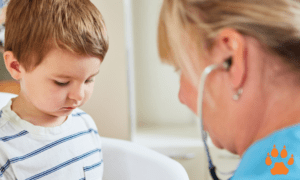By: Dr. Veja Tillman, DVM
With every hurricane we learn new lessons about being prepared and disaster planning. Hurricane Ian was no exception. It gave us a stark reminder to always be prepared, plan early, and to not take warnings lightly. Hurricane season in Southwest Florida starts June 1st. Let’s get our pets emergency and disaster-ready before the next hurricane strikes. They are a part of the family too!
Get a Pet Emergency Kit
A collection of basic supplies that you may need in the event of an emergency:
- Food and Water for at Least 3 Days:
On average, companion pets require 1–2 ounces of water per pound per day. If your pet has special medical conditions, is very active, or pregnant, their needs may be higher. - Pet Medications (2-week supply):
Rotate medications frequently to maintain quality. Plan for any medications that require refrigeration. - Pet First Aid Kit:
These can be purchased online. Consult your veterinarian for any additional items specific to your pet’s condition. - Updated Pet Identification:
Include microchip registration, ownership documentation, your contact info, and pictures of you with your pet. Keep both printed and digital copies—store them in cloud storage and download them to your phone. - Updated Vaccination Records:
Include your veterinarian’s name, phone number, address, and email. - Crate or Carrier, Harness, Leash, and Collar
- Litter Box and Cleanup Supplies:
Include pet litter, plastic bags, paper towels, and disinfectants. - Comfort Items:
Familiar toys, bedding, and treats to help keep pets calm during the storm, whether at home or in a shelter. - Pack It Smart:
Store your emergency kit in a waterproof, easy-to-carry tote. Keep it in a climate-safe, accessible location, and make sure all family members know where it is. - Vet Consultation:
Ask your veterinarian for advice on preparing a kit tailored to your pet’s specific needs.
Before the Storm
- Evacuate Early If Advised:
Don’t wait. Pets may hide when scared, making evacuation more difficult. - Identify Safe Havens:
Ask family or friends outside the evacuation zone if they can host you and your pet. - Find Pet-Friendly Hotels:
Research and bookmark pet-welcoming accommodations in safe zones. - Emergency Boarding Options:
Contact local boarding facilities that provide storm sheltering for pets. Reserve early. - Medical Concerns:
Talk with your vet if your pet needs ongoing care or supervision. - Save Emergency Contacts:
Gather phone numbers and addresses of emergency pet care facilities—both locally and outside of storm zones—and store them in your phone. - Make a Family Plan:
Assign responsibilities (like who picks up the pet), designate meeting locations, and ensure everyone knows and practices the plan.
After the Storm
- Wait for the All Clear:
Return home only when authorities declare the area safe. - Delay Your Pet’s Return if Needed:
Leave pets at shelters or boarding facilities until your home is fully safe. - Watch for Hazards:
Be alert for debris, wildlife, downed power lines, and other dangers to pets. - Use Generators Outdoors Only:
Keep all gas-powered equipment outside and away from animals.
Stay Informed
- Know the Risks:
Understand the types of emergencies possible in your area. - Sign Up for Alerts:
Register for city and county emergency notifications via phone or email. - Follow Official Channels:
Monitor state and federal emergency management websites and social media for reliable updates. - Know Local Evacuation Routes and Shelters
June is Disaster Awareness and Microchip Your Pet Month
Contact us today to schedule a microchip appointment for your pets!
About Dr. Veja Tillman, DVM
Dr. Tillman is a 2002 graduate of Tuskegee University School of Veterinary Medicine. Her practice focuses on the health and wellness of pets. She is the owner of Just 4 Pets Wellness Center.
📍 8911 Daniels Parkway, Suite 7, Fort Myers, FL 33912
📞 239-270-5721
🌐 www.Just4PetsFL.vet








